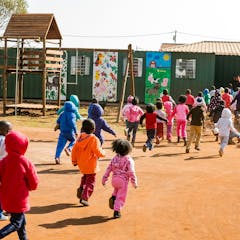
Articles on Early childhood development
Displaying 1 - 20 of 38 articles

When parents are starting their babies in daycare, a common concern is whether it is good for them to be away from their primary carers for long periods of time.

Neither hopefulness nor childhood development can occur in a vacuum. Strong relational bonds matter, too.

There should be a standard policy across all South African universities related to recognition of prior learning as a criterion for entrance.

The increase in children with developmental concerns may flow from the erosion of protective factors that support children during early development.

Around half of toddlers who aren’t chattering by age two will catch up later, but we can’t predict which ones.

Some babies bottom-shuffle along. Others commando crawl on their tummy. Some babies move hands first with their bent knees following along like they are playing game of leapfrog.

A professor of child development explains why it’s OK – recommended, in fact – to respond to an infant’s every cry, sob and whimper.

Early childhood development principals aren’t just educators: they’re also managers and business people, and those skills are critical.

A ‘learning journey’ research process exposed a broad group of participants to local realities of the food system and childcare in a small town.

There are opportunities for intervention in the education system to address gaps in psycho-social provision and support.

Early childhood development centres in South Africa, particularly in low-income communities, provide services which many of these children and their families wouldn’t cope without.

Demonstrating for parents how to talk with their babies and toddlers can improve kids’ vocabulary and math skills, new research finds.

Every small change to promote healthy levels of screen time is a step in the right direction for the health, wellbeing and development of children.

Grocery shopping and family meals are prime opportunities to build reading and math skills – particularly for young Latino children, a new study finds.

Nutrition for kids is key to achieving economic development.

The early years are when a child is most vulnerable, but it is also the time when effective interventions can deliver the biggest returns.

Kindergarten enrollment dropped 16% this year, according to an NPR survey of 60 school districts across 20 states.

Guidance on strong passwords has changed and children need to learn about it in a way that suits their stage of development.

Parents who use screens excessively in front of their kids may unwittingly sow the seeds of screen addiction and its consequences.

It’s been 25 years since autism was redefined and the surge in diagnoses and research began. But while we’ve come along way in our understanding of the spectrum, advances in drug therapies has lagged.





